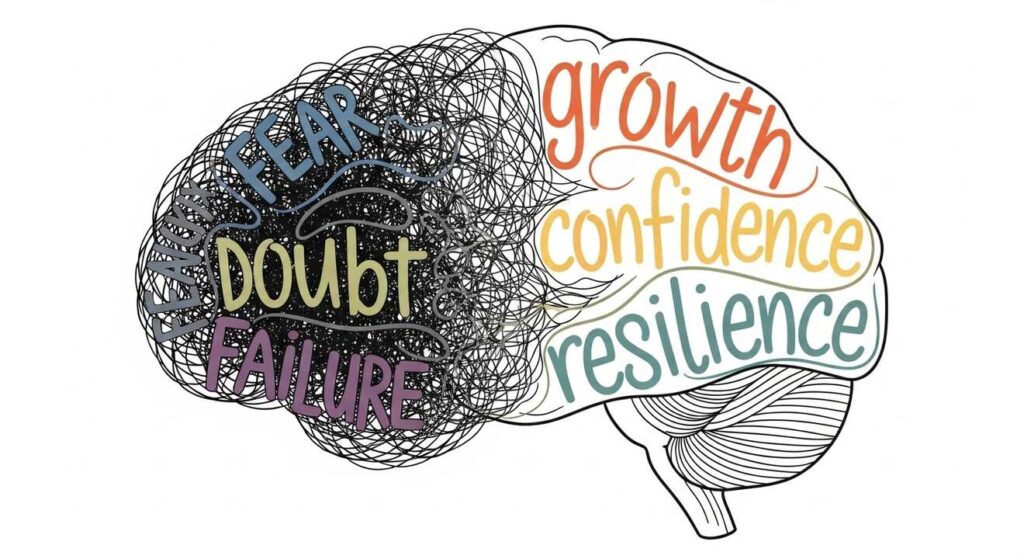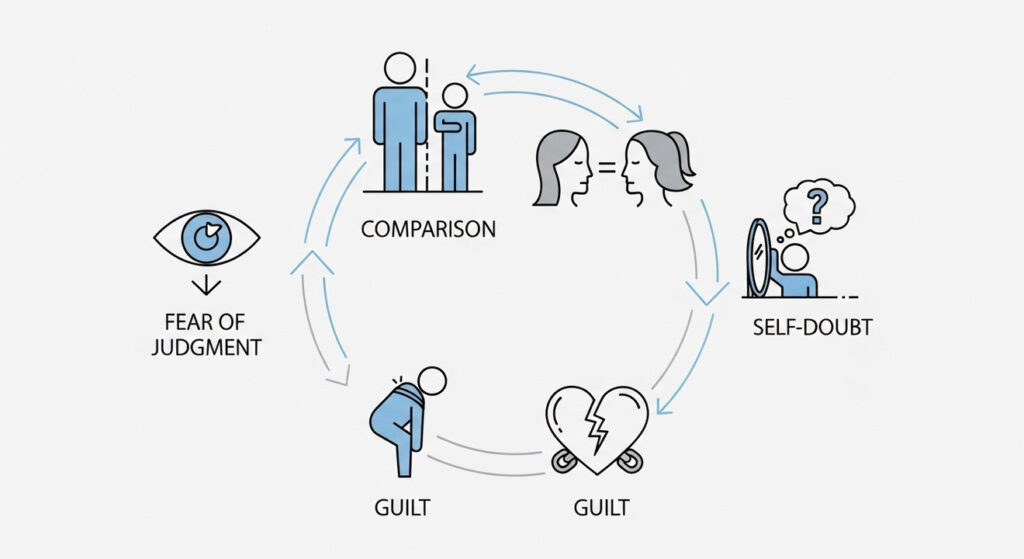Ever had a great idea or goal, then instantly thought, “I’m not good enough,” or “What if I fail?”?
That’s a toxic thought. And over time, thoughts like these turn into limiting beliefs, the quiet stories we tell ourselves that make us doubt our abilities and hold back from opportunities.
They often sound like facts, but they’re not. They’re just old patterns we’ve picked up from past experiences, fear, or things others once said.
The good news? You can change them.
In this article, we’ll talk about where these beliefs come from, how they quietly sabotage your progress, and how to start shifting them so you can stop playing small and start showing up for the life you actually want.
Let’s get into it.
What Are Toxic Thoughts and Limiting Beliefs?
Toxic thoughts are the negative, repetitive ideas that quietly shape how you see yourself and what you believe you can achieve. They drain your confidence, fuel fear, and keep you playing small often without you realizing it.

You might hear them in your mind as:
- “I’m not smart enough.
- “I always mess things up.”
- “Success isn’t for people like me.”
These are limiting beliefs, false assumptions you’ve accepted as truth, usually shaped by past experiences, criticism, or fear. Maybe someone made you feel incapable once, and now that voice lives in your head.
Limiting beliefs are powerful because they feel real, even though they aren’t. They stop you from applying for the job, launching the idea, or taking the risk, even when you’re fully capable.
The key is to recognize these thoughts for what they are: old stories, not facts. Once you become aware of them, you can start to challenge and change them, creating space for growth, confidence, and success.
Trace the Roots of Self-Doubt
Self-doubt doesn’t come from nowhere; it’s usually rooted in early experiences that quietly shaped how you see yourself.
Maybe a parent told you not to dream too big, thinking they were protecting you. Or a teacher once dismissed your potential, and that moment stuck. Sometimes it’s a past failure that left you too scared to try again.
These experiences plant seeds of doubt. Over time, they grow into beliefs like “I’m not good enough” or “I shouldn’t take risks.” And without even realizing it, you start living cautiously, avoiding challenges that could actually help you grow.
But here’s the truth: self-doubt is learned, not permanent. And once you identify where it came from, you can begin to let it go and replace it with a mindset that supports your success.
How Toxic Thinking Sabotages Success

Toxic thoughts don’t just live in your head they show up in your choices, your actions, and your habits. If you constantly believe you’re not capable or not good enough, you’ll unconsciously behave in ways that protect that belief. Instead of reaching higher, you play it safe. Instead of pushing forward, you pull back. Here’s how it happens:
It Fuels Procrastination
One of the most common effects of toxic thinking is procrastination. When you doubt your ability to succeed, you start putting things off, not because you’re lazy, but because you’re afraid. Afraid to fail. Afraid to be judged. Afraid to find out you’re not as capable as you’d hoped. So you stay busy with distractions or endless planning, but never actually take the next step. This delays progress and keeps your potential locked away.
It Leads to Self-Sabotage
Toxic thoughts often trigger self-sabotage. You might avoid applying for opportunities you actually want, talk yourself out of good ideas, or give up just before things start working. These actions are usually unconscious, driven by a deeper belief that you don’t deserve success or that you’re bound to fail anyway. It’s a way of protecting yourself from disappointment but in reality, you’re standing in your own way.
It Triggers Imposter Syndrome
Even when you succeed, toxic thinking can make you feel like a fraud. You downplay your accomplishments, tell yourself it was luck, and live in fear that someone will “find you out.” This is imposter syndrome, and it’s fueled by the belief that you’re not actually good enough to be where you are. It keeps you anxious, insecure, and stuck even at the top.
It Shrinks Your Goals
When your inner voice is filled with doubt, you stop aiming high. You tell yourself to be “realistic,” but what you’re really doing is settling. Toxic thinking convinces you that dreaming big is risky or irresponsible. So you lower your standards, stay within your comfort zone, and never explore what you’re truly capable of.
It Keeps You Comfortable But Unfulfilled
The comfort zone feels safe, but it’s often where dreams go to die. Toxic thinking makes you avoid discomfort, challenge, or growth because those things come with uncertainty. But success lives outside of comfort. If you’re always avoiding discomfort to protect your ego, you’ll miss out on the very experiences that lead to growth, confidence, and fulfillment.
Signs You’re Stuck in a Loop of Limiting Beliefs

One of the trickiest things about limiting beliefs is that they often operate beneath the surface. You might not even notice them because they feel like your normal way of thinking. But if you look closely, there are clear signs that your mindset may be keeping you stuck.
You Regularly Talk Yourself Out of Good Ideas
You come up with something exciting, a new goal, a creative project, a bold career move but almost immediately, you talk yourself out of it. You convince yourself it’s not the right time, you’re not ready or it probably won’t work. That’s not logic, it’s fear dressed up as practicality.
You Fear What Others Will Think
You hesitate to take action because you’re worried about judgment, criticism, or rejection. Whether it’s speaking up, showing your work, or setting a boundary, the fear of how others will perceive you becomes louder than your own desires. This fear often stems from a belief that your worth is tied to outside approval.
You Constantly Compare Yourself to Others
You scroll through social media or look around at colleagues and think, “They’re doing so much better than me.” Instead of focusing on your own progress, you measure your worth against someone else’s highlight reel. This habit is fueled by the belief that you’re behind or not good enough, which keeps you feeling discouraged.
You Feel Guilty When Things Go Well
Strangely, even success can trigger discomfort. You might feel like you didn’t earn it or that something bad is bound to follow. This feeling of unworthiness makes it hard to celebrate your wins, leaving you stuck in a cycle where no amount of achievement feels like enough.
Reframing Toxic Thoughts: Practical Strategies

The first and most powerful step in overcoming toxic thinking is awareness. You can’t change what you don’t recognize. Many of your limiting beliefs are automatic; you’ve thought them for so long that they feel normal. But once you start paying attention, you’ll see how often your thoughts are holding you back.
Here’s a simple four-step process to begin reframing them:
Catch the Thought
Notice the exact moment you feel anxious, doubtful, or small. That uncomfortable feeling is usually triggered by a thought. Pause and ask yourself, “What did I just tell myself?”
Label It
Once the thought is clear, name it for what it is: “That’s a fear-based thought,” or “That’s an old belief.” Labeling helps you create distance between you and the thought instead of getting consumed by it.
Challenge It
Now ask: Is this really true?
Where did I learn this?
Would I say this to someone I love?
Most limiting beliefs don’t hold up when you question them honestly.
Reframe It
Replace the old story with a more helpful one.
Instead of “I can’t do this,” say, “I’m learning how to do this.”
Instead of “I always mess things up,” try, “I’m growing through experience.”
You don’t need to flip the switch from insecure to fearless overnight. You just need to move from “I can’t” to “Maybe I can.” That shift opens the door to growth.
Daily Mindset Practices to Crush Limiting Beliefs

Changing your mindset isn’t a one-time event; it’s a daily commitment. Just like you care for your body with food and movement, you need to care for your mind with intention and repetition. Here are a few simple practices that help rewire limiting beliefs over time:
Affirmations
Start your day by speaking kind, empowering words to yourself. Choose phrases like,
“I am capable.”
“I am allowed to take up space.”
“I’m becoming more confident every day.”
Repeating affirmations consistently helps your brain build new, supportive pathways.
Visualization
Close your eyes and picture yourself succeeding. See the version of you who is confident, calm, and clear. Visualization helps your brain experience success before it happens, making it feel more achievable.
Progress Journaling
Each night, write down one small win from the day. It could be anything: a tough conversation you handled, a task you finished, or a moment of self-awareness. This practice trains your mind to focus on growth instead of gaps.
Meditation
Even five minutes a day can help. Sit quietly, notice your thoughts, and observe them without judgment. Meditation strengthens your ability to witness thoughts instead of believing every single one.
Conclusion
Toxic thoughts and limiting beliefs might feel true, but they’re just old stories shaped by fear, past experiences, or other people’s opinions. Left unchallenged, they quietly hold you back from the success you’re capable of.
The good news? You can change them.
By becoming aware of these thoughts, labeling them, and choosing more supportive beliefs, you begin to shift your mindset. With small daily practices like affirmations, journaling, and visualization, you can rewire your thinking and build real confidence.|
You don’t need to be fearless, just willing to question the thoughts that keep you small and take one step forward at a time.
You’re not broken. You’re just outgrowing a mindset that no longer serves you. Let go of the old story, and start showing up for the life you’re meant to live.





